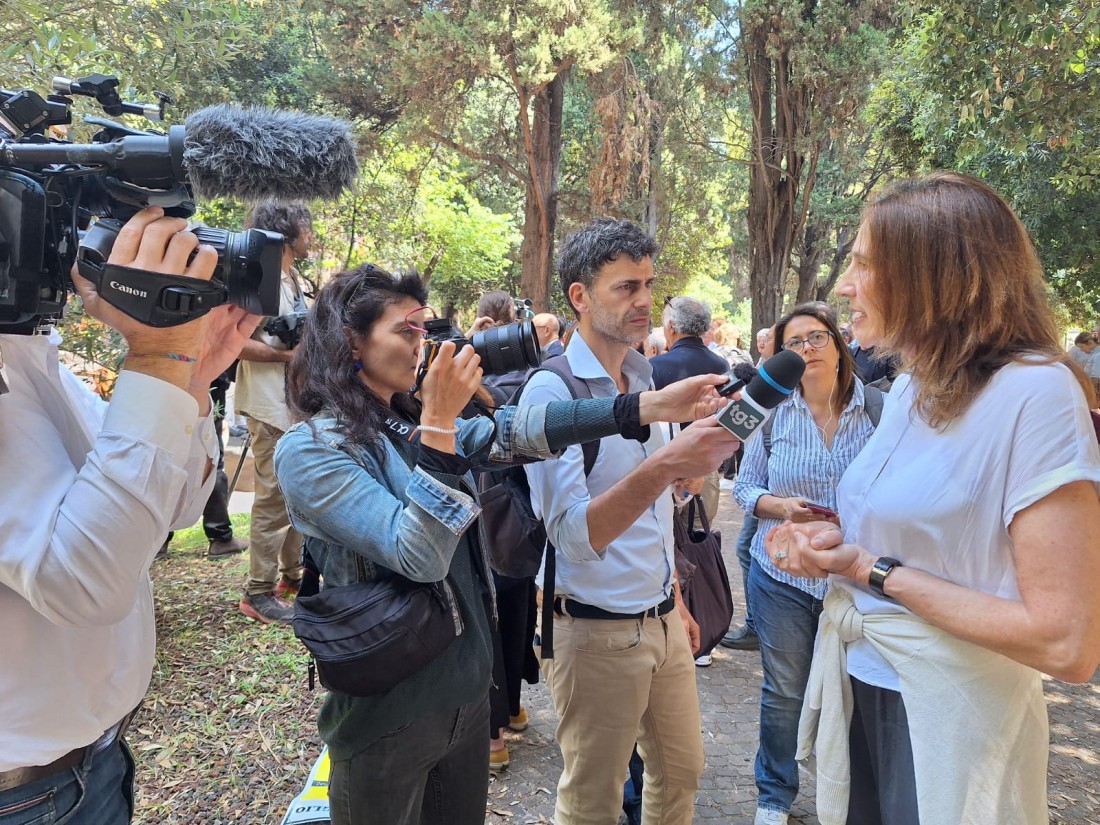Amid the forthcoming EU elections, the Media Freedom Rapid Response (MFRR) was prompted to organize an urgent advocacy mission to Italy on May 16-17 to address some recent developments related to press and media freedom. Such concerns included unprecedented political interference in the public service media, legal harassment of dissenting journalists by government members, and the potential acquisition of AGI news agency by MP Antonio Angelucci.
Italy’s current state of media freedom raises significant concerns. The worrying trend of political interference and legal harassment undermines democratic principles and threatens the independence and pluralism essential for a free press.
During its visit to Rome, the MFRR delegation met with officials of several institutional bodies, such as:
- Senator Barbara Floridia, President of the Parliamentary Committee for the general direction and supervision of radio and TV broadcasting in the Chamber of Deputies;
- Senator Ilaria Cucchi, Deputy Chairwoman of the Justice Committee of the Senate of the Republic;
- Giacomo Lasorella, President of the Italian Communications Regulatory Authority (AGCOM) alongside AGCOM board members;
- MP Valentina Grippo, member of the Italian delegation to the Parliamentary Assembly of the Council of Europe;
- Dr Pierluigi Mazzella, Italian Government representative at the Steering Committee on Media and Information Society (CDMSI) of the Council of Europe;
- Members of the Permanent Representation in Italy of the European Commission.
The MFRR delegation also met with several journalists from various media outlets, trade unions, and representatives of civil society organizations to analyze the state of play of media freedom in the country, joining the Unione Sindacale Giornalisti Rai (USiGRai) sit-in dedicated to press freedom in front of RAI headquarters.
Most regretfully, the mission did not have the opportunity to meet anyone from the ruling coalition, as all the requests for a meeting were either declined or ignored.
Political interference in public media
Radiotelevisione Italiana (RAI), the Italian public service broadcaster, is currently subjected to an unprecedented degree of political interference that risks leading to a potential full state control. Although a certain politicization of RAI is not a new phenomenon, discussions with journalists from RAI confirmed the unprecedented level of pressure and self-censorship.
The delegation welcomed Senator Barbara Floridia’s initiative promoting a national convention (“Stati Generali”) composed of all political parties, independent media experts, and other stakeholders, directed at reforming public media’s governance and funding in line with the European Media Freedom Act.
Failure to decriminalize defamation and reform defamation civil code provisions
Journalists, particularly investigative ones exposing wrongdoings by politicians and publishing information of public interest, face an increasing number of vexatious lawsuits often led by members of the current government, including the Prime Minister, Giorgia Meloni
Instead of joining the European trend towards decriminalizing defamation and bringing it under civil law, and starting to transpose the EU’s anti-SLAPP Directive, the Italian government chooses to go in the opposite direction. The Balboni Bill, which was proposed by the ruling coalition to reform defamation, not only fails to decriminalize defamation and to consider a comprehensive reform under the remit of the civil law. If approved, the provisions of the Balboni Bill risk compressing the space of editorial independence even further and exerting a heavier chilling effect on the journalistic community.
Potential acquisition of AGI news agency
The potential acquisition of one of the country’s leading news agencies, AGI (Agenzia Giornalistica Italiana), by MP Antonio Angelucci – who already controls several major newspapers – poses a significant risk to AGI’s editorial independence.
If it comes to fruition, the buyout would be in contrast with Article 6 of the European Media Freedom Act, stating that editorial managers must be free to make decisions without interference and that anyone with significant interests in media service providers must declare any conflicts of interest. Moreover, it could set a dangerous precedent that could put other news agencies in the country at risk.
Recommendations
- We call on the Italian parliament together with independent experts, the journalists representative organizations, such as the Federazione Nazionale Stampa Italiana (FNSI) and the Italian Chamber of Journalists (Ordine dei Giornalisti), in consultation with the European Broadcasting Union (EBU) to initiate a comprehensive reform of the legislation regulating Italian public broadcasters in line with Article 5 of the European Media Freedom Act;
- We urge the Italian Parliament to implement a comprehensive reform of defamation laws, aligning them with EU and international freedom of expression standards;
- If any acquisition bid for the news agency AGI concretizes, regulators AGCOM and AGCM (Autorità Garante della Concorrenza e del Mercato) should conduct a thorough and transparent evaluation and consider the impact on media pluralism, editorial independence, and conflict of interest, in accordance with the European Media Freedom Act.
MFRR Next steps
In the coming weeks, the MFRR will continue to closely monitor developments in the country in collaboration with local partners, and will reiterate the request for online meetings with representatives of the Italian ruling coalition. The final report outlining the key findings with a list of recommendations geared at the Italian government, but also the European Commission will be released in the coming months. The consortium experts are ready to offer their expertise to promote the independence of public media and press freedom in Italy.
The delegation was composed of representatives from ARTICLE 19 Europe, the European Centre for Press and Media Freedom (ECPMF), the European Federation of Journalists (EFJ), the International Press Institute (IPI), and OBC Transeuropa (OBCT).
This mission was part of the Media Freedom Rapid Response (MFRR), a European mechanism that tracks, monitors and responds to violations of press and media freedom in EU member states, candidate countries and Ukraine. The project is co-funded by the European Commission.

